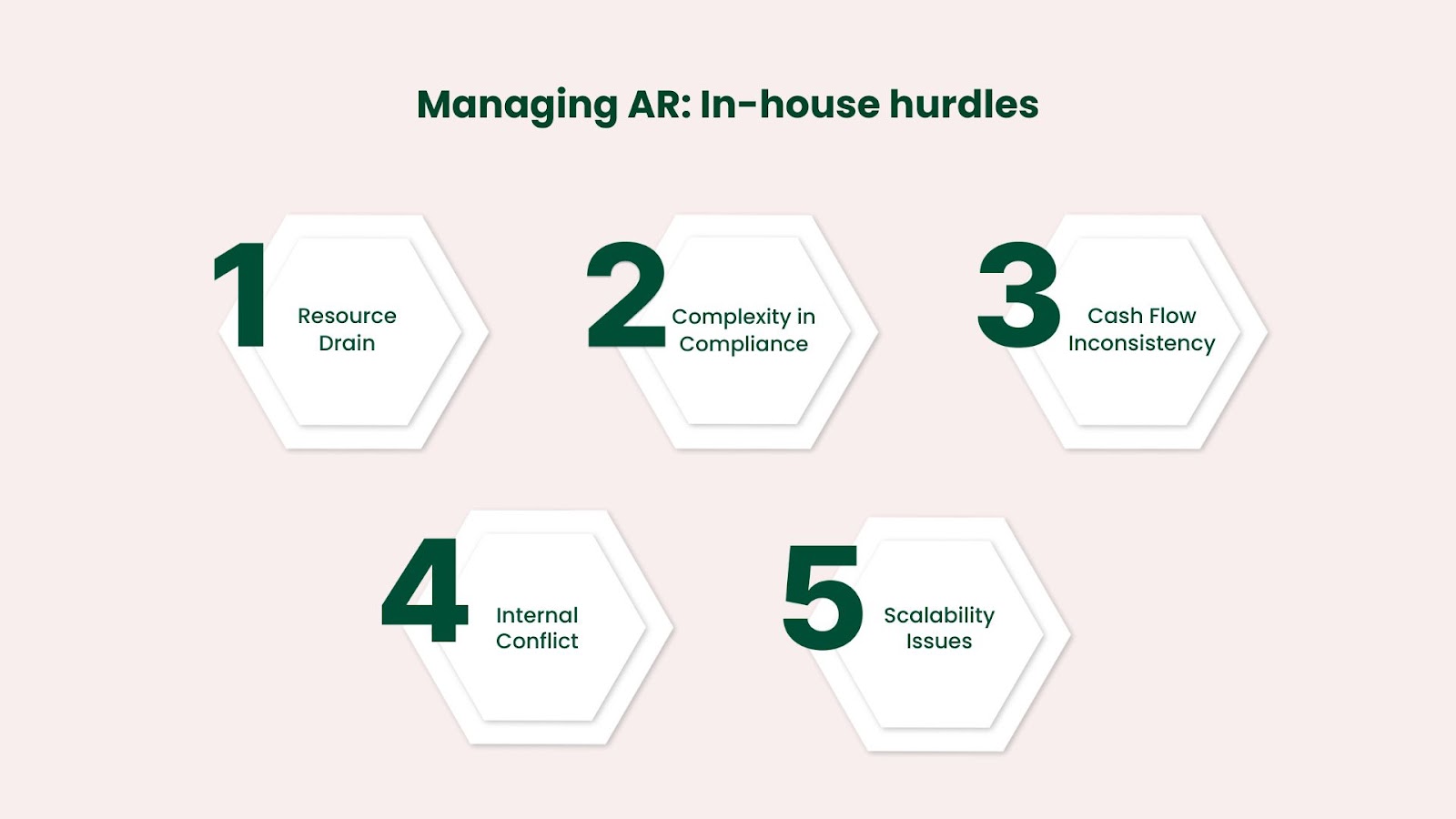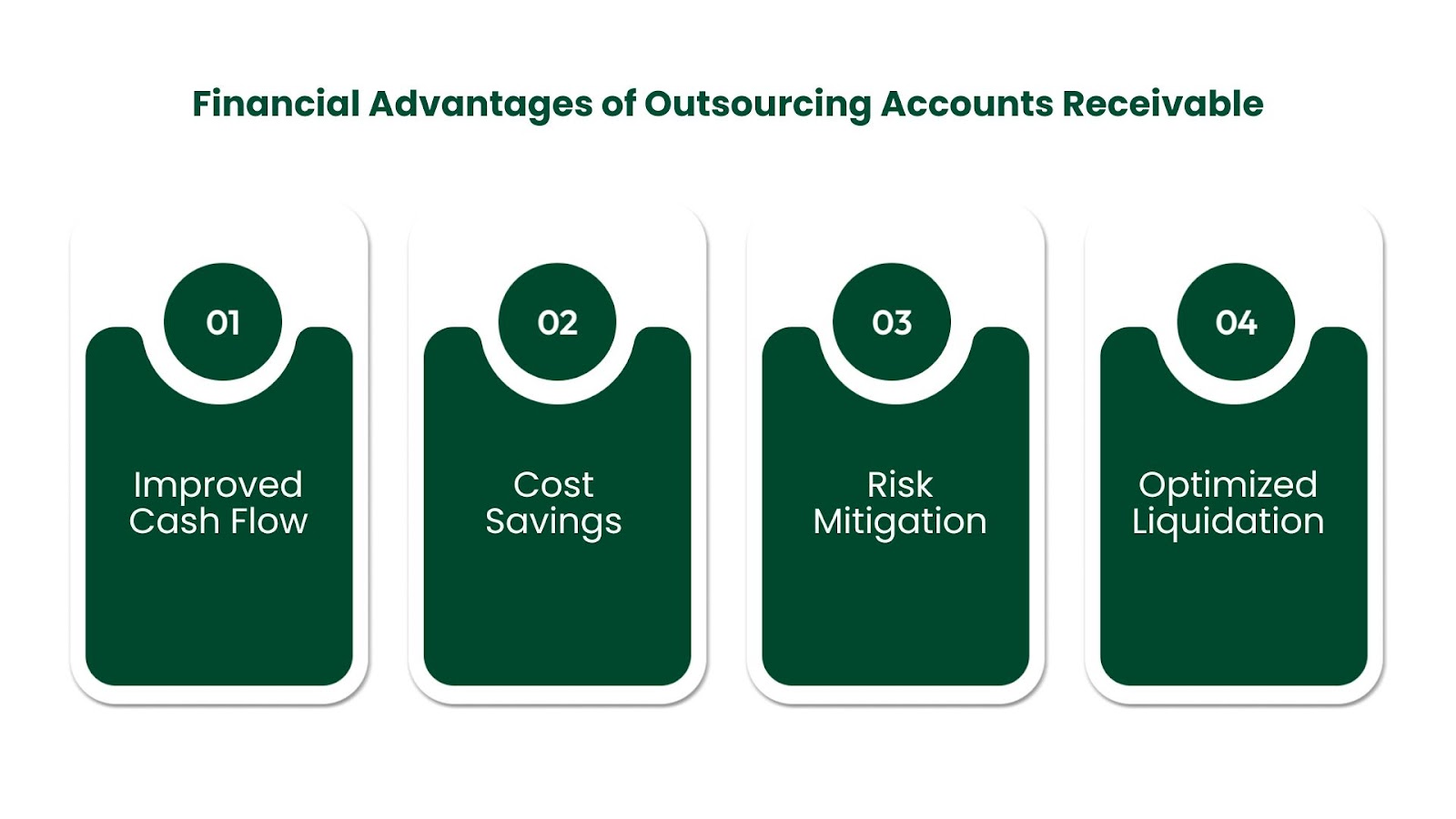
Every dollar in accounts receivable represents capital for business growth. Despite this, companies struggle with efficient AR management, leaving significant revenue uncollected and causing financial strain.
Outsourcing accounts receivable management to specialized agencies equipped with the expertise and technology to transform outstanding invoices into actual revenue can be a viable solution.
Recent studies highlight the magnitude of this issue. According to PYMTS data, 22% of US small businesses struggle to pay bills due to distressed receivables and disrupted cash flow.
For many businesses, these statistics signify not merely numbers but tangible effects on operational capabilities and growth potential.
Implementing efficient AR management strategies has become essential, rather than optional, as economic pressures continue to challenge profit margins.
The question isn't whether your business can afford to outsource AR management—it's whether you can afford not to.
Let's examine why an increasing number of companies are opting for specialized AR management agencies to enhance their receivables management and fortify their financial foundation.

Managing accounts receivable internally can create significant roadblocks that hinder your company's growth and operational efficiency.\
Here are some major challenges businesses face while managing accounts receivable independently.
Maintaining an in-house accounts receivable (AR) department requires dedicated staff, continuous training, and management oversight.
Financial professionals often spend 30-40% of their time following up on late payments, rather than focusing on strategic initiatives.
This diversion of talent creates opportunity costs that compound over time as your team struggles with competing priorities.
The regulatory landscape for collections is increasingly complex and varies significantly across jurisdictions.
The Fair Debt Collection Practices Act (FDCPA) and state-specific regulations create a maze of compliance requirements that require specialized knowledge. Non-compliance penalties can range from $1,000 per violation to millions in class-action settlements.
Most internal AR teams lack the dedicated legal expertise to navigate these changing regulations, exposing your business to significant liability with each collection attempt.
Unpredictable payment timelines create cash flow volatility, impacting everything from purchasing inventory to growth planning.
This cash flow inconsistency forces many companies to rely on expensive short-term financing options, creating a cycle of unnecessary interest expenses that eat into profitability.
Your sales team builds relationships, while your accounts receivable (AR) department pursues payment, creating an inherent tension that can damage customer relationships.
This conflict often results in inconsistent messaging and enforcement of payment terms, as internal teams hesitate to jeopardize relationships with valuable clients.
This balancing act results in the selective enforcement of payment policies, with preferential treatment often being given to larger accounts, regardless of their payment history.
As your business grows, AR management becomes exponentially more complex. Manual processes that worked for dozens of accounts break down with hundreds or thousands of customers.
Scaling without specialized systems and workflows creates bottlenecks that slow collections and increase DSO (Days Sales Outstanding).
Growth-stage companies often experience an increase in DSO during rapid expansion phases, which can directly impact working capital when needed.
South District Group's network of legal representatives across all fifty states helps businesses counter these challenges through sophisticated account management methodologies.
The limitations of in-house AR management explain why more companies are seeking specialized partners, but what specific advantages can outsourcing provide?
Let's examine the operational benefits that make outsourcing a compelling solution.
Outsourcing your accounts receivable function creates operational efficiencies that internal teams simply cannot match, regardless of their dedication or skill.
Let’s look at the operational benefits of outsourcing your accounts receivable management.
Specialized AR firms bring focused expertise only gained from managing diverse receivables portfolios across multiple industries.
Their collectors undergo continuous training on effective communication techniques, compliance updates, and industry best practices.
At South District Group, our team offers 30 years of industry experience for every client. This expertise helps identify payment behavior patterns that internal teams may overlook and implement strategies to enhance collections.
Dedicated AR firms invest in sophisticated technology that would be cost-prohibitive for most individual businesses.
These systems incorporate predictive analytics to identify which accounts are most likely to make payments, automated workflow management, and comprehensive tracking tools.
The most effective collection agencies utilize AI-powered scoring models that enhance collection rates by prioritizing accounts more effectively and employing personalized approach strategies.
South District Group's in-house skip-tracing functionality and advanced scoring systems exemplify how specialized technology transforms recovery rates.
As your business grows or faces seasonal changes, outsourced accounts receivable (AR) solutions adapt quickly without the delays of hiring and training new staff. This scalability ensures consistent performance amidst volume fluctuations.
During economic downturns, collection agencies experience an increase in workload, which they can manage through their existing infrastructure.
South District Group's established processes allow them to quickly and compliantly manage portfolios at each stage of the account lifecycle, providing flexibility that internal departments cannot match.
Outsourcing AR eliminates the administrative burden of managing an internal collection department, freeing your staff to focus on core revenue-generating activities.
This efficiency stems from the specialized workflows and focused attention that dedicated agencies bring to the task.
Unlike your internal team, which may handle collections alongside other responsibilities, South District Group's collectors focus exclusively on converting receivables to cash.
Large-scale AR management requires geographic reach to navigate regional regulations and optimize collection strategies. National networks provide comprehensive coverage that internal teams simply cannot replicate.
The South District Group maintains a network of legal representatives across all 50 states, ensuring compliant and effective collection strategies regardless of debtor location.
This nationwide approach can yield higher collection rates than localized efforts, particularly for businesses with customers across multiple states.
While these operational advantages are compelling, the financial benefits of outsourcing accounts receivable create an even stronger case for working with specialized partners.
Let's examine how outsourcing directly impacts your bottom line.

Beyond operational improvements, outsourcing accounts receivable (AR) delivers measurable financial benefits that directly impact your bottom line.
Time to understand the financial advantages of Outsourcing Accounts Receivable Management.
Outsourcing accelerates payment cycles, converting aging receivables into working capital faster than internal teams.
Professional collection agencies recover payment on twice as many past-due accounts within the first 30 days compared to in-house efforts.
This acceleration creates predictable cash flow patterns, enabling better budgeting and reducing reliance on credit lines.
Many businesses report being able to reduce their operating lines of credit within six months of outsourcing their accounts receivable (AR) function.
Maintaining an internal collections team involves hidden costs beyond salaries, including training, management oversight, benefits, software licenses, and physical workspace, which are additional expenses.
For most businesses, these costs represent 2-3% of the total value of receivables managed.
Outsourced solutions operate on performance-based models where you pay only for results, eliminating fixed overhead regardless of collection success.
The financial impact of compliance violations can be devastating. FDCPA violations result in penalties up to $1,000 per occurrence plus legal fees.
One major compliance case can easily cost thousands of dollars in settlements and legal expenses.
Professional agencies maintain comprehensive compliance programs and carry specialized insurance that protects your business from these risks.
Specialized agencies employ tailored collection approaches based on account characteristics, which yield higher recovery rates compared to standardized internal processes.
South District Group's tailored liquidation strategies exceed client needs. We use advanced analytics to identify the best timing and approach for each account, maximizing revenue recovery and reducing reputation risk.
Now that we've explored the financial benefits, let's examine how to select the right outsourcing partner to ensure your business realizes these advantages.
Selecting the right AR partner can significantly impact your results and overall experience. Not all agencies deliver the same value, capabilities, or approach.
Consider the following points before choosing an outsourcing partner.
The South District Group embodies these qualities through its extensive vetting process for service providers, a sophisticated account management methodology, and a focus on building strong relationships while delivering bottom-line results.
Now that you understand what to look for in an AR management partner, let's examine how these principles transform your accounts receivable function.
Effective accounts receivable management forms a critical foundation for sustainable business growth and financial stability. Outsourcing AR management delivers both immediate and long-term benefits.
Companies that partner with specialized agencies report improvements in DSO (Days Sales Outstanding), directly enhancing working capital without additional investment.
Outsourcing is a strategic investment in your company's financial health and operational efficiency.
The right AR management partner becomes an invaluable extension of your business. This relationship requires careful consideration of experience, compliance standards, technological capabilities, and customer interaction approaches.
With over a decade of experience converting distressed receivables to cash, South District Group combines proven collection networks, sophisticated analytics, and strong compliance standards to maximize recovery.
Our team specializes in servicing accounts at each stage of the lifecycle, offering the transparency and compliance protection businesses require while generating predictable cash flow.
Ready to reduce your DSO and free up capital? Reach out to South District Group and discover how our compliance-first AR strategies turn aging receivables into real cash flow.